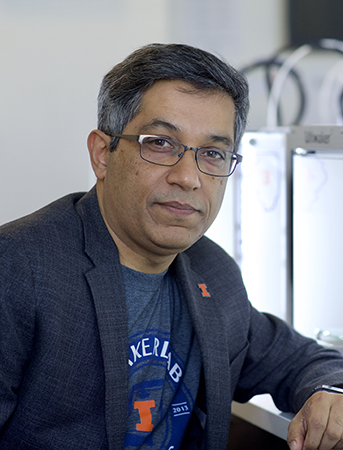Aug 26, 2024
Gies MSBA students create innovative AI tool to streamline industry-academia collaboration
Nine students in the Master of Science of Business Analytics (MSBA) program at Gies College of Business have designed a groundbreaking tool that streamlines how industry and Illinois faculty collaborate on research projects.
This team’s innovative solution uses generative AI to analyze data from different platforms, including faculty profiles, academic databases, and government grant websites such as NIH and NSF. By consolidating this information, the tool efficiently matches industry needs with relevant faculty expertise and applicable grant funding.

Led by Clinical Associate Professor Vishal Sachdev (left), the project stemmed from the practical needs of Discovery Partners institute (DPI), a state funded organization dedicated to applied research and fostering Chicago’s tech ecosystem. This initiative aligns with DPI Director of Research Dr. Venkat Venkatakrishnan’s vision for the EDA-funded project he leads: “Economic Development through Deep-Tech Science Teams: From Research Labs to Commercial Ventures.” It was guided by Marcia Silva, DPI associate director of research and development, and Sam Miller, DPI corporate relationship manager of research and development.
“We haven’t had a single source for identifying the latest research from professors in the University of Illinois System,” said Miller. “This tool speeds up finding the right fit between businesses and the University.”
“Similarly, there’s been no central repository for available grant money from business and government sources,” said Silva. “This solution addresses the challenges in interacting with researchers or staff who need solutions for their daily needs.”
The powerful tool aggregates information about research expertise from Illinois Experts and Google Scholars and culls grant funds from the National Science Foundation and National Institutes of Health. It is designed to eventually scale to the entire University of Illinois System and add large governmental databases.
“We believe this first-of-its-kind solution will become an essential resource for enabling faster collaboration between industry and academia,” said Sachdev, director of Gies’ MS in Business Analytics and DPI Faculty-in-Residence.
“The students did outstanding work,” said Silva. “Vishal’s effort to involve students in real-world problems is very bold. It was very beneficial to DPI because it addressed a real problem.”
The student team was all enrolled in Gies’ STEM-designated MSBA – a nine-month, full-time residential program in which students learn how to use data to solve complex business problems. For this project, the students conducted on-site interviews in Chicago with DPI stakeholders.
These initial discussions led to scoping three projects: One, run by Aditi Tiwari (MSBA ’24), focused on researching the safety of artificial intelligence. It explored the reliability of large language models (LLM) and how businesses and academic institutions are forming coalitions and conducting research to improve LLM safety. Another, led by Subham Shaurav (MSBA ’24) aimed to streamline the grant acquisition process for researchers, and a third, run by Panshul Saraswat (MSBA ‘24) explored building a tool to connect researchers with industry projects. Once the overlapping need emerged, they combined efforts on the latter two.
For the students, this project was a key to securing their first jobs after earning the MSBA.
“Sharing the length and breadth of the topic and how it solved a real problem helped me stand out during my job search,” said Tiwari.
Added Saraswat, “When presenting myself, I have a compelling story about my experience collaborating with clients on a daily basis to move a complex project forward.”
“I learned how to manage the expectations of a cross-functional team with differing levels of experience,” said Shaurav.
DPI is partnering with Gies to build on these learning outcomes with future project participants.
“The next phase will make the tool’s database more dynamic so that as a researcher’s interest and expertise evolves, we can quickly capture that,” said Silva, who added that DPI is also looking to identify more governmental agencies and foundations that offer grants for academic research.


